[Tablet Magazine] A few months before he was buried under the rubble of his Beirut bunker, the late leader of Hezbollah, Hassan Nasrallah, repeated to his followers, as he had done many times before, his famous line that Israel was "weaker than a spider’s web." That is, Israel was an artificial implant that structurally was bound to collapse. All it needed was sustained violence and patience. The end result was inevitable: Israel would vanish from the map with a wave of the hand.
The fantasy that Nasrallah peddled to his followers and "resistance" fans was not, on its face, entirely ungrounded. Iran, a much larger country than Israel, with 10 times the population, was a rising power. Its regional reach spanned from the Gulf to the Mediterranean. It had established missile bases on Israel’s borders and on a critical maritime passageway in the Red Sea. It controlled four Arab capitals and dominated the landmass across Iraq through Syria into Lebanon. In addition, Iran was allied with the United States’ two great rivals, Russia and China. In short, for Nasrallah and the resistance faithful, it appeared certain that Iran was inexorably ascendant.
In reality, Iran’s winning hand was a mirage. It took Israel 21 months to blow through it—15 of which were during a hostile American administration that actively tried to hobble the Israeli effort, to prevent the Iranian Wizard of Oz and his legions of flying monkeys from being scattered to the winds.
Gaza, Iran’s southern front, is now a wasteland, which, if President Donald Trump implements his stated plan, will be emptied of most if not all of its inhabitants—or at least those who choose not to live in rubble. Whether Trump’s Gaza plans rise or fall, it’s unlikely that Israel will ever cede control over the strip’s border with Egypt, which means that Gaza as an active front against Israel is gone for good.
Next to go was Hezbollah, the oldest and best equipped of Iran’s regional terror assets—indeed, the lynchpin of its regional network. Within three months in 2024, Israel eliminated the group’s entire command structure, decimated its infrastructure along the shared border, and blew up its weapons caches. Despite a U.S.-imposed cease-fire, Israel has maintained operational freedom and continues to take out cadres and arms caches inside Lebanon at will, with Hezbollah unable to mount any response.
Not long after Nasrallah’s demise, the other big piece on the Iranian board tumbled. In a matter of days in December 2024, the Assad regime, the Islamic Republic’s strategic ally since the 1979 revolution, was gone. Hollowed out by a decade and a half of war, and with Hezbollah eviscerated and Russia bogged down in Ukraine, the 53-year rule of the Assad family was suddenly history. In its place, a new Sunni regime in Damascus, Syria, is now intercepting weapons shipments to Hezbollah.
Iran’s multiple militias in Iraq, another card in the mullah’s winning fantasy poker hand, didn’t bother to deploy in Syria and have largely been irrelevant in the axis’ confrontation with Israel. While Iran maintains political clout in Baghdad, its militias there have proved worthless as a military instrument in its regional project, as Iraqi Shia turn out to look good only on paper while displaying little motivation to get slaughtered by a superior enemy on behalf of Iranian adventurism.
With its Levantine network in shambles, Tehran’s most relevant proxy over the past 20 months has been the Ansar Allah group (the Houthis) in Yemen. The Houthis have held global shipping in the Red Sea hostage while occasionally lobbing missiles and attack drones at Israel. As a result, they too have been hit hard, by both the IDF and the United States and Britain. In recent days, the Houthis have threatened to resume targeting U.S. ships in the Red Sea, which would likely invite a punishing response.
Finally, there was Iran itself: the home base of the mighty resistance axis. In recent years, Israel had already shown how thoroughly it had penetrated Iran. From the theft of the mullahs’ entire nuclear archive to multiple sabotage operations and high-value targeted assassinations, including taking out Hamas leader Ismail Haniyeh in the heart of Tehran in July 2024, Israel showed the ability to operate with ease throughout Iran—including in the country’s most sensitive and well-guarded places. The country’s intelligence services and decision-making echelons were forced to assume that Israel was privy to the regime’s secrets and could kill its leadership at will.
After making short shrift of Iran’s air defense systems in October, Israel demonstrated its total military superiority this month, gaining full control of Iran’s airspace and going to work on its nuclear facilities, ballistic missiles and launchers, command and control of the Islamic Revolutionary Guard Corps (IRGC), and the nuclear program’s top scientists, clearing the way for the United States to demolish Iran’s three main nuclear sites at Fordow, Natanz, and Isfahan. And with that, Iran’s nuclear dreams went up in smoke, much like its regional enterprise.
Since Israel thrashed Hezbollah a year ago, and the cascade of wins that followed, the global reaction to its achievement has been one of surprise—shock at the comprehensiveness of the Israeli domination and the complete Oz-like hollowness of the Iranians. But the Iranian regional position, much like its nuclear program, was a function not of Iranian strength but most crucially of U.S. support. If the Iranians were illusionists, the fuel for their tricks came from an America that repeatedly wrote monetary and diplomatic checks under the assumption that the magic act was real.
This applied across the board. In Iraq, the American nation-building project ensured the Iranians a sanctions-busting vehicle and protection. Whenever a Sunni revolt against the post-2003 order emerged in Iraq, the Iranians relied on the United States to put it down and prop up Tehran’s assets in the country.
But it was in Syria where Iranian dependence on U.S. protection was most evident. When Syria’s Sunnis rose against Iran’s vassal, Bashar al-Assad, Iran mobilized its Lebanese and Iraqi assets to prop him up. Soon it was sending Afghan and Pakistani Shia into the Syrian theater, too. Still, it wasn’t able to put down the uprising, despite Assad using chemical weapons against population centers.
Yet it turned out that Iran and Assad had little to fear from direct American involvement in Syria. When Tehran’s ally, then President Barack Obama, finally intervened in 2014, it was against the Islamic State group, which the United States and Iran’s Iraqi assets were partnering against in Iraq as well. Regardless, by 2015, Iran’s position in Syria was still wobbly. It required Obama facilitating the entry of Russia’s air force into Syria to help Iran’s militias gain the upper hand, though even that was not enough to take back the whole country.
Similar to Iraq, the American nation-building enterprise in Lebanon was also a condominium with Iran designed to protect Tehran’s holdings. Much as the Obama administration teamed up with Iranian assets in Iraq under the cover of the "anti-ISIS campaign," it did the same in Lebanon behind the veneer of supporting "state institutions," which allowed Hezbollah to protect its flank while prosecuting Iran’s war in Syria. Moreover, at various points before Oct. 7, Washington intervened to dissuade Israel from responding to Hezbollah provocations, locking it instead in diplomatic and even economic arrangements with Hezbollah-controlled Lebanon. Even after the group opened the front against Israel on Oct. 8, 2023, the Biden administration deterred Israel from attacking in response. Even the cease-fire the administration announced in November 2024 was reportedly imposed under threat of a U.S.-backed U.N. Security Council resolution against Israel.
The IRGC and its regional proxies all benefited from American protection under the Obama team’s three terms in office. While Obama protected the IRGC from being designated as a foreign terrorist organization, and his deal with Iran removed international sanctions on regime terror chief Qassem Soleimani, the Biden administration likewise removed Yemen’s Houthis from the terror list. With Obama’s help, the IRGC consolidated its position across the region.
U.S. protection and funding—including, for example, the famous 2016 direct payment of $1.7 billion in cash—were at the heart of Obama’s deal with Iran. The JCPOA not only legitimized Iran’s nuclear weapons program but also protected Iran’s nuclear assets with an international, namely American, shield. That shield took the form, among other things, of leaks against potential Israeli preemptive strikes on Iran’s nuclear sites. In fact, Obama administration officials bragged about blocking Israeli military action, declaring that it was now too late for Israel to do anything: The administration had successfully protected its new ally’s nukes.
For more than a decade, Israel has had to work around this American protective cover. Fear of leaks intended to sabotage Israeli operations was so pervasive under Biden that the Israelis did not give advance notification of the September strike that killed Nasrallah. The following month, ahead of Israeli retaliatory strikes against Iran, the administration made clear its objection to any Israeli targeting of Iranian nuclear or energy facilities. It took Israel as long as it did to destroy Iran’s nuclear program and regional project only because Washington hobbled it for all but six of the past 21 months, between diplomatic pressure and threats, slow-rolling arms deliveries, and micromanaging the Israeli war effort, especially in Gaza.
So what changed? As the past few weeks have demonstrated, the key variable—the difference between a U.S.-protected nuclear Iran that dominates the region, and the geopolitical picture we have today, with Iran cut down to size—is leadership. Any misalignment on either side, in the United States or Israel, could well have prevented the current outcome.
Had the Obama team’s campaign to unseat Prime Minister Benjamin Netanyahu succeeded at any point between 2021 and 2024, it seems unlikely that Netanyahu’s American-approved replacement would have been able to successfully navigate the post-Oct. 7 landscape and destroy Iran’s regional project. Likewise, had Trump lost the 2024 election or, worse still, had he not turned his head at that precise moment in Butler, Pennsylvania, the likelihood of American support for the destruction of Iran’s nuclear weapons program drops to zero. Remove the great men of history, and everything defaults back to the Obama structural settings on the Democratic and also some of the Republican side of the aisle.
Even now, you can see it in some of the comms environment in Washington, after the U.S. strikes on Iran, where we’re hearing things from both Democrats and Republicans about the need for a "long-term settlement" with Iran, to be accompanied, no doubt, by endless new rounds of negotiations. Over what, exactly? A new and improved JCPOA, after having destroyed all their centrifuges and facilities? Why? Who cares?
President Trump put it best. When asked if he’s interested in restarting negotiations with Iran, the president was dismissive: "I’m not. ... The way I look at it, they fought. The war is done. I could get a statement that they’re not going to go nuclear ... but they’re not going to be doing it anyway. ... I’ve asked [Secretary of State] Marco [Rubio], ’You want to draw up a little agreement for them to sign?’ ... I don’t think it’s necessary."
The president is being praised for using military force while eschewing long-term commitments and entanglements. The corollary of that policy is, properly, for America to walk away after the strikes yet threaten to bomb again should the need arise. Everything else, whether it’s a new "deal" or the hope of "integration" for a "moderate" Iran, is static from the Obama signal.
Why the D.C. establishment, left and right, feels such an intense attachment to Iran defies any rational cost-benefit analysis related to the national interest. It therefore can only be explained by extrinsic factors that are probably best explained by a shrink who specializes in subjects like "white guilt" or "the burdens of empire"—which means I am obliged to take a pass. I can only observe that this attachment is a powerful one that must therefore signify something important to those who continue to feel its attraction, even when the United States and Iran are at war.
Fundamentally, D.C. is a pro-Iran town, where factions on the left and right have shown a core investment in ensuring that Iran has the means and the opportunity to go nuclear as part of their political programs at home. Why? Again, I can only speculate, as it so clearly defies basic calculations of the national interest. Perhaps they see Iran, as Obama did, as a useful tool in factional wars against domestic political rivals.
Luckily for the rest of us, the behavior of D.C. sewer dwellers matters far less now, thanks to President Trump and Prime Minister Netanyahu. The illusion that the D.C. establishment has maintained, hand in hand with Iran, for decades, has been shattered. The proxy armies that formed Iran’s "Axis of Resistance" are no more. We can even pinpoint the moment when Israel pulled the curtain aside: Sept. 27, 2024, the day it killed Nasrallah, whose Iranian masters turned out to be part of the same illusion that he was.
Now that the Ayatollah’s monkeys have scattered, whatever remains or does not remain of Iran’s nuclear program doesn’t much matter, even while anonymous sources in Washington do their best to put cards back into the regime’s hand by claiming that Fordow wasn’t "fully" destroyed and other such irrelevancies. The spell is broken, and the regime’s regional alignment, which was at the heart of both its threat to its neighbors and its strategy of deterrence, has been shattered beyond any hope of easy repair. Now it’s time for Washington and regional leaders alike to deal with reality.
|
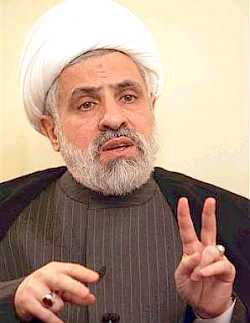
 ...Arabic term meaning
...Arabic term meaning 
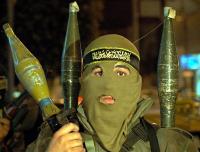 ..always the voice of sweet reason...
..always the voice of sweet reason... ...The Leb civil war, between 1975 and 1990, lasted a little over 145 years and produced 120,000 fatalities. The average length of a ceasefire was measured in seconds. Only one of those statements is an exaggeration....
...The Leb civil war, between 1975 and 1990, lasted a little over 145 years and produced 120,000 fatalities. The average length of a ceasefire was measured in seconds. Only one of those statements is an exaggeration....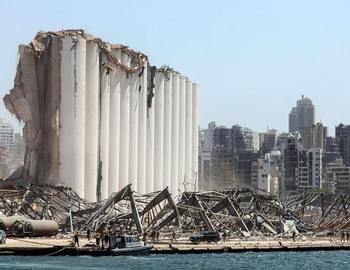 ...Formerly inhabited by hardy Phoenecian traders, its official language is now Arabic, with the usual unpleasant side effects....
...Formerly inhabited by hardy Phoenecian traders, its official language is now Arabic, with the usual unpleasant side effects.... [IsraelTimes] Executive order follows through on May promise to remove restrictions blocking Damascus from global finance, in move that could bolster bid to bring country into Abraham Accords
[IsraelTimes] Executive order follows through on May promise to remove restrictions blocking Damascus from global finance, in move that could bolster bid to bring country into Abraham Accords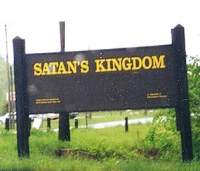 ...a kingdom taking up the bulk of the Arabian peninsula, largely made up of sand and oil rigs. Its primary economic activity involves exporting oil and soaking Islamic rubes on the annual haj pilgrimage. The country supports a large number of princes in whatcha might call princely splendor. Formerly dictatorial and steeped in Olde Tyme Religion, deferring to Salafist holy men on all issues, it has now done a 180 and is making a serious effort to modernize, so as not to be left in the sand by its Gulf Arab neighbors. The holy men have been shoved to the background and the nation is now still dictatorial but somewhat rational. That doesn't make them trustworthy, but it's a start...
...a kingdom taking up the bulk of the Arabian peninsula, largely made up of sand and oil rigs. Its primary economic activity involves exporting oil and soaking Islamic rubes on the annual haj pilgrimage. The country supports a large number of princes in whatcha might call princely splendor. Formerly dictatorial and steeped in Olde Tyme Religion, deferring to Salafist holy men on all issues, it has now done a 180 and is making a serious effort to modernize, so as not to be left in the sand by its Gulf Arab neighbors. The holy men have been shoved to the background and the nation is now still dictatorial but somewhat rational. That doesn't make them trustworthy, but it's a start...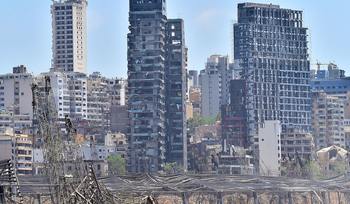 ...an Iranian satrapy until recently ruled by
...an Iranian satrapy until recently ruled by 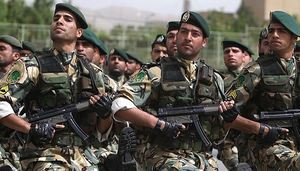 ...a theocratic Shiite state divided among the Medes, the Persians, and the (Arab) Elamites. Formerly a fairly civilized nation ruled by a Shah, it became a victim of Islamic revolution in 1979. The nation is today noted for
...a theocratic Shiite state divided among the Medes, the Persians, and the (Arab) Elamites. Formerly a fairly civilized nation ruled by a Shah, it became a victim of Islamic revolution in 1979. The nation is today noted for 